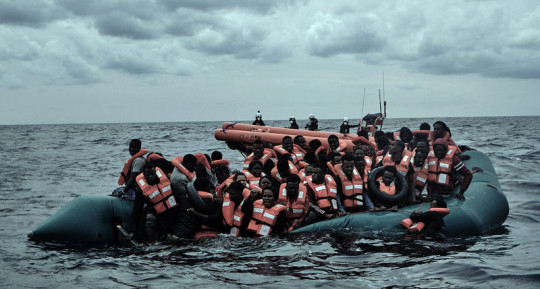 An online only lecture about the political consequences of the crisis with the refugees in the Mediterranean will be presented by Dr Stelios Michalopoulos, on Thursday 4 August 2022, at 7pm, as part of the Greek History and Culture Seminars offered by the Greek Community of Melbourne. An online only lecture about the political consequences of the crisis with the refugees in the Mediterranean will be presented by Dr Stelios Michalopoulos, on Thursday 4 August 2022, at 7pm, as part of the Greek History and Culture Seminars offered by the Greek Community of Melbourne.
Europe is currently witnessing the largest refugee crisis since WWII. The economic behavior of the refugees and the spillovers they generate has been an active area of research over the last few years. Nevertheless, little is known about their political behavior. This study is the first step to fill in this gap. We focus on Greece. A country whose population swelled by more than 20% within a few months in 1923 as a result of the Greco-Turkish war and the subsequent population exchange, the first-ever to be coordinated by the League of Nations. The majority of the arriving 1.5 million Greek Orthodox settled in the urban centers in slums, relocation camps, and refugee settlements in preexisting as well as newly constructed neighborhoods.
Accessing the historical archive of the League of Nations, we georeference the universe of refugee neighborhoods (approximately 250 locations) across all urban centers. We combine the latter with newly geocoded voting stations within towns over the last 100 years. Using a spatial regression discontinuity design comparing adjacent native to refugee areas in the same part of the city we find that refugee areas are systematically more likely to vote towards anti-establishment parties mainly towards the left. We then turn to explore the mechanisms at work. Property prices and other observable urban amenities are comparable suggesting that economic disparities are muted. Cultural factors may be at work. To shed light on this we collect a comprehensive catalog of Greek songs produced over the last 100 years and distinguish between singers and lyricists of refugee and native origin. Machine-learning techniques reveal stark differences in the tone and the themes between the two groups. Songs of refugee-origin artists are more emotionally laden conspicuously featuring topics pertaining to inequality, marginalization, grievances, and anger. We show that political parties with similar rhetoric obtain a larger following in the refugee neighborhoods. These findings are consistent with the idea that major historical events are immortalized in the songs and the folklore of a given community and, although the material circumstances that produced these songs may change over time, the narratives persist conditioning the behavior of the affected groups.
Dr Stelios Michalopoulos is the Eastman Professor of Political Economy at Brown University, a Research Associate at the NBER, and a Research Fellow of the CEPR. A native of Argos, Greece, Stelios holds a B.A. and MSc from the Athens University of Economics and Business and a Ph.D. in Economics from Brown University. After completing his doctorate in 2008, he joined the department of economics at Tufts University as an Assistant Professor. In 2010-2011 he was the Deutsche Bank Member at the Institute for Advanced Study at Princeton. In the Spring of 2015, he was a visiting Assistant Professor at Harvard Business School, in 2016 a visiting Professor at INSEAD, and a Senior Scholar at the Minneapolis Federal Reserve Bank in 2017. Stelios is the recipient of the 2015 Excellence Award in Global Economic Affairs from the Kiel Institute for the World Economy and the recipient of the 2019 Bodossaki Prize in the field of Social Sciences a biennial award bestowed to scientists of Greek origin up to 40 years of age, to reward their commitment and effort in the advancement of science. His work has been funded by the NSF and DFID among others. His primary research interests lie in the intersection of political economy, culture, growth, and comparative development.
When: Thursday 4th August 2022, 7pm
Speaker: Dr Stelios Michalopoulos
Platform: Youtube, Facebook |